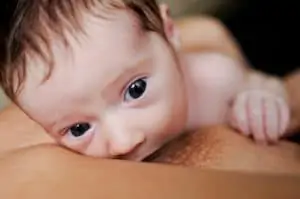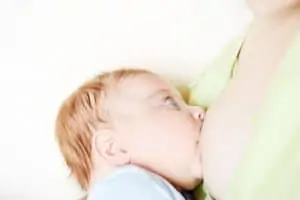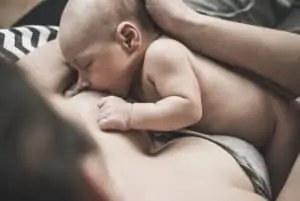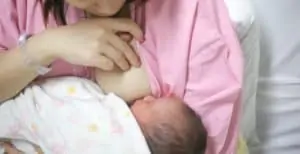I always consider myself so lucky that I got to breastfeed both of my daughters into toddlerhood. But I had friends with health conditions that mandated taking certain medications. Because those medications weren’t safe for breastfeeding, they basically had to end their breastfeeding adventures immediately.
Another friend of mine had the worst heartbreak of all. I’m tearing up as I type this because it makes me so sad to try to comprehend. After a month of being a mama to a newborn, her son died from SIDS.
In these situations, when breastfeeding suddenly ends, it can be even more traumatic. Plus, the problems your body goes through on top of it. And in my friend’s case, easing the baby into a new way of feeding on medication was rough.
By far, it’s easier when you make a plan to wean gradually. After all, the AAP has always urged exclusive breastfeeding for 6 months and the introduction of solid foods for the remaining 6 months of the first year while still breastfeeding. When I weaned each of my daughters, they were more than ready for it physically. Mentally, they had a hard time letting go of the milk boobies.
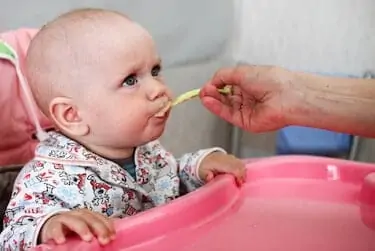
Still, it’s a lot easier when you plan for it rather than suddenly having to contend with not breastfeeding. In this post, I’m going to walk you through what happens when you stop breastfeeding and drop in some helpful official resources so you can make sure you have all your bases covered.
Weaning in the 1st Year and Beyond
Let’s start with the first year. Most moms don’t wean until after the baby celebrates that first birthday. I had one friend, Antoinette, whose son developed a nasty habit of biting her. So she was well on her way to weaning him before he turned 1.
Since he was eating solids “like a ravenous shark,” in her words, she felt comfortable weaning him. She’d pump her breastmilk, slowly giving him some formula. Once he turned 1, he was fully on board with this whole thing. He was a happy kid, even if he was a biter.
She switched to giving him cow’s milk after he got out of the first year, and he ate more and more solids. He also preferred a sippy cup instead. But not all kids are the same, as we know.
Let’s look at mine.
Both of my daughters wanted to keep breastfeeding forever. Eventually, there comes a time when you’re ready to stop, and even if they don’t want to admit it, they are too.
What they DON’T want to give up is that closeness to you. Once I figured that out, helping each of them transition into going without the boobies was much easier.
My friend Marlese had to wean her 2-year-old daughter. She half wanted to do it, and half wanted to hang onto those breastfeeding days forever. It’s so relatable. I totally get it.
But the thing about it was that she had multiple issues that were interfering with it. And she wanted to put little Lissette into preschool to socialize. Not wanting to deal with pumping and bottles and all the things that come with handing a breastfed baby to a caregiver, she decided to do her weaning very quickly.
If your child is older, you can follow these tips from La Leche League to make it a lot easier when you have to rip off that virtual bandage and make it happen:
- Shake up the routine so your toddler won’t think to ask for milk boobies
- Hand over some snacks and drinks before a usual nursing time
- Let distractions help pull you through
So, what happens now?
Changes That Happen When You End Your Breastfeeding Days
Now, it’s important to note that when you stop breastfeeding, many changes will happen. It’s a crazy time.
When I weaned my eldest, I eliminated all her nursing sessions except the one right before bedtime. I’ll never forget that we had her busy with her bedtime routine, and I tucked her in, and she didn’t ask for boobies. And she went right to sleep! I realized I had weaned her, but I cried and cried. AND CRIED. Oh, how I cried! In a word, it was bittersweet.
Even when you’re ready for it, you’re not really ready for it, you know? But it all has to end at some point, so here’s what will happen when it does.
- Your milk supply dries up
One of the side effects of weaning is that your milk supply dries up. But this isn’t an overnight thing. Even if you have to stop abruptly, your body is still producing milk. Just as you had to build up your milk supply when your baby came into this world, you now have to get your brain the message that no more milk is needed.
It’s not like a light switch. You can’t just power it off.
If you’ve been weaning, you will see that much of your milk supply will be gone somewhere around 7 to 10 days. I’m trying to remember when my eldest was weaning. I don’t even think I had to express any milk after that. My body knew by then that it was time for the cows to come home.
Hormonal changes after weaning aren’t limited to shutting down the milk factory either. While the hormones indicate your body to make milk (or shut down shop), that’s not the only thing going on here.
If you want that production to cease and desist faster, you’ll want to watch out for a few things. Namely, stimulation. Tell your husband to watch his fingers. Any stimulation can send the wrong signal and delay the process of drying your milk stores up.
- Swollen, achy breasts
You can bet the farm that an engorged breast after stopping breastfeeding is also on the horizon, whether you wean or stop suddenly. You’ll have to be proactive to be kind to your breasts. It’s sad for them too!
Initially, you may feel very full and heavy in your boobs. While it’s tempting to express that milk or pump it, don’t do it. You can express just a little to get some comfort if the pain is severe, but you don’t want to drain them completely. If you do, you trigger those breastfeeding hormones, and they start making more milk.
Again, since my girls were well into toddlerhood when I weaned them, this wasn’t as much of an issue for me. However, the next point was a huge bone of contention.
- Sadness that borderlines depression
Post-weaning depression is genuine. You’d be right to assume that it would be even worse if you suddenly lost your baby and weaned. But even when you do it the slow and steady way when you’re ready, you will still feel sad and emotional.
Cue up Whitney Houston’s “So Emotional.”
Anyway, this can be attributed to hormonal changes after weaning. Your prolactin and oxytocin levels drop. So there’s the chemical explanation.

But then there’s this whole thought of OMG; my baby isn’t a baby-baby anymore. And you remember that first time you held your baby. You remember the first smile. The first burp. Crawling. Walking. All of it.
And you cry. AND CRY. Get lots of tissues. And talk about it. With your husband, with friends. If the sadness persists after a while, talk to your doctor too. There are ways to get back your balance and feel like you again.
By the way, you’re not the only one sad about this. Your baby or toddler is sad too. My youngest was much harder to wean because she’s such a clinger. She’s a very loving child, and finding other ways to spend time with her, like our daily snuggle, which we still have, helped her adjust.
Children of this age feel rejected because they don’t understand it any better. So when you wean, think of your baby, too, as you work through your emotions and learn new ways to bond.
- Potentially saggy boobs
I want to address something here. Many women worry about breastfeeding before starting because they’re afraid their breasts will sag. But to blame it on breastfeeding isn’t accurate. It is a pregnancy that could be a factor in sagging boobs.
The more pregnancies you have, the more likely your boobs will start pointing south. It can also be attributed to your weight (and how much you gain and lose), genetics, and other health habits.
Lucky for me, my breasts didn’t sag. But it might be because mine were small until I had kids. They’re surely not as bouncy and perky as they were when I was in my 20s, but hey, that’s what good bras are for.
- Your period might be different
Another common occurrence for most breastfeeding moms after they wean is a change in the menstrual cycle. La Leche League says many women don’t get their periods while breastfeeding. I got mine maybe 6 to 8 months after each of my daughters’ birth, and I was still breastfeeding. So it really depends.
Your fertility levels may be of concern too. If you’re not ready to expand your family just yet, keep watch on your basal temps and ovulation. Or use protection. And if you are, well, get on it!
There might be other things you notice too. If something concerns your health, either physically or mentally, talk to your doctor to get the help you need.
Breastfeeding Cessation FAQs
I get lots of questions from concerned mamas out there who want to know what’s going on. I’ve gathered a few of the most common ones I’ve received lately to help get you the answers you’re looking for.
How long for hormones to balance after weaning?
Well, it’s not going to happen overnight, so try to be patient. But after weaning, you can expect those hormones to return to how they were before you were pregnant anywhere from 6 to 8 weeks later. That does NOT mean you will feel weird for that long.
I felt more like myself about 2 weeks later, but I’d say by 8 weeks, I definitely felt like I remembered feeling before getting pregnant.
Do you lose weight after stopping breastfeeding?
My breastfeeding coach, Vivien, had sympathized with me one day because I was frustrated; I was still what I’d referred to as “fat.” She reminded me that I wasn’t fat and doing the most important job in the world. That put things in perspective.
When I started breastfeeding my daughters, I quickly dropped pregnancy weight and then plateaued. Vivien told me it would be easier to lose weight after I stopped breastfeeding. Years later, I made that happen, but that was largely my fault (I blame tacos, pizza, and donuts).
In any event, it’s basically a crapshoot. Some of my friends lost ALL their weight breastfeeding. Others were like me and only lost some of it. And I had friends that gained weight while breastfeeding.
You CAN lose weight after you stop breastfeeding. But part of that involves you actually eating nutritiously and getting exercise. AND, something else.
See, the thing for me was occasional donuts aside; I was eating healthfully and exercising. But I wasn’t sleeping well. Lack of good sleep affects your weight because it unleashes more cortisol, the stress hormone. So, work on getting more sleep. And reducing your stress, which will help you lose weight after breastfeeding.
How to decrease milk supply to stop breastfeeding?
When you’re ready to stop breastfeeding, you should pump or express just a little milk by hand. Do so at regular intervals to relieve your discomfort. It will slowly decrease. You don’t ever just want to stop and do nothing. That could cause a blocked duct, mastitis, engorged breasts, or an abscess.
And when you are full of milk, the baby can smell it. So you will want to do all you can to slow it down. If your baby is younger, you will have to work harder at this task. Every 2 or 3 days, express less milk each time, and you’ll send that message to the brain that the milk boobies have left the building.
How long after I stop breastfeeding will I stop producing milk?
Because my girls were bigger and not nursing with the frequency of a baby, it took maybe a few days to a week. For other friends, it took several weeks for the milk to dry up. It could take time, and you’ll need to be patient.
You can trot out those breast pads to keep you from leaking everywhere as you work out your weaning process. You can do other things to relieve the pain, like compresses and even cabbage, until your body balances out.
If you stop breastfeeding, can you start again?
Yes, you can! It’s called relactation. And if you decide you don’t like formula feeding your baby and want to start breastfeeding or that your medication won’t interfere with breastfeeding, you can absolutely do it.
I recommend finding a lactation consultant to help you if this is your goal. It’s not always possible to get your milk back to full production once you stop breastfeeding, but even a smaller amount of it can really do wonders for your baby’s health.
One final thought on stopping breastfeeding…
Some moms are forced to stop breastfeeding due to something traumatic, like the death of their baby. Others choose to do so. No one should ever judge you for whatever circumstances make you stop breastfeeding. Whether you breastfed your child for a year and decided you’ve had enough or you had to work hard to wean them before they turned 3 so everyone would stop picking on you.
Your life, your body, your child. Only you can decide what is best, and if your doctor gives their blessing on your health as well as that of your baby, you know your decision is the right one for you.
Leslie Berry lives with her husband and two young daughters in Los Altos, California, where she loves helping other moms get comfortable with motherhood and embracing the insanity with facts peppered with laughs.
She loves eating too much sushi, exercising, and jamming out on her Fender. Read more about Leslie here.

